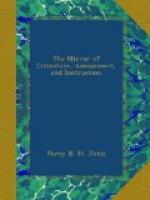The fleeting moments of too short a life,
Total extinction of th’ enlighten’d soul!
Or else, to feverish vanity alive,
Wilder’d and tossing through distemper’d dreams?
Who would in such a gloomy state remain
Longer than nature craves, when every Muse
And every blooming pleasure wait without,
To bless the wildly devious morning walk?”
Exquisite indeed! But this too is a proof how nearly the sublime and ridiculous are associated,—“how thin partitions do their bounds divide;” for this fine poetry is associated, in most reader’s minds, with Thomson’s own odd indulgence in the “dead oblivion.” He was a late riser, sleeping often till noon; and when once reproached for his sluggishness, observed, that “he felt so comfortable he really saw no motive for rising.” As if, according to the popular version of the story, “I am convinced, in theory, of the advantage of early rising. Who knows it not, but what can Cato do?” “Ay, he’s a good divine, you say, who follows his own teaching; don’t talk to us of early rising after this.” Why not, unless like Thomson, you’re kept up till a very late hour by business? The fact is he did not
—“In that gloomy state
remain
Longer than nature craves,”
after all. He had a strong apology for not rising early, in the late hours of his lying down. The deep silence of the night was the time he commonly chose for study; and he would often be heard walking in his library, at Richmond, till near morning, humming over what he was to write out and correct the next day, and so, good reader, this is no argument against my position; but observe, retiring late is no excuse for late rising, unless business have detained you: balls and suppers are no apology for habitual late rising. And now, my dearest readers, do you spend the night precisely as Thomson did, and I’ll grant you my “letters patent, license, and protection,” to sleep till noon every day of your life. You have only to apply to me for it through “our well-beloved” editor of the MIRROR.
W. P——N.
* * * * *
BUNHILL FIELDS BURYING-GROUND.
This extensive burial-place is part of the manor of Finsbury, or Fensbury, which is of great antiquity, as appears by its being a prebend of St. Paul’s Cathedral in 1104. In the year 1315, it was granted by Robert de Baldock to the mayor and commonalty of London. Part of it was, in 1498, converted into a large field for the use of archers and other military citizens to exercise in. This is now called The Artillery Ground.




